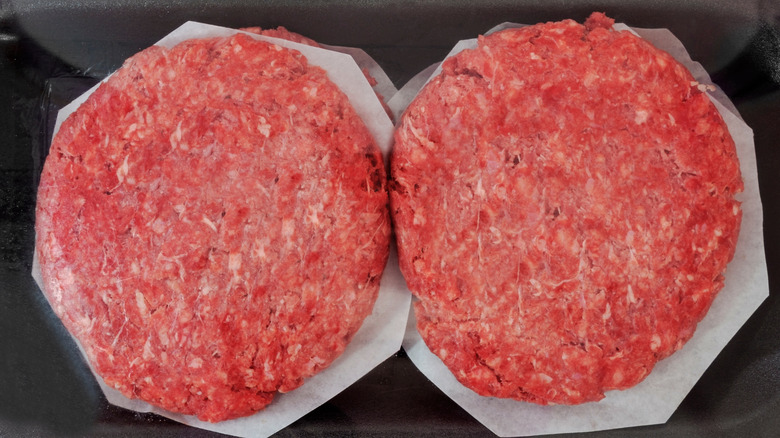Is It Safe To Eat Gray Hamburger Meat?
The watery, red liquid in your package of meat is nothing to turn your nose up at. It's a natural part of the lifecycle of packaged meat, and the red color is due to the myoglobin that is carried out by escaping moisture. Myoglobin, an oxygen carrying protein, is very reactive when exposed to air. As the American Meat Science Council explains, before it comes into contact with oxygen, myoglobin is a deep magenta. Upon contact, it changes to the vibrant red hue most people associate with red meat, especially beef. But after prolonged exposure to oxygen, the pigment metmyoglobin is formed, which gives the meat a brownish-gray hue that can be a real bummer.
The old adage says, "You eat with your eyes," and it turns out that is fairly close to the truth. A paper published in the journal Flavour outlines just how important color is when it comes to our perception of food. It is the foundation of our expectations of a food item, and changes in color are a potent disruptive force that can alter our experience before it begins. Naturally then, the question arises, is it safe to eat meat, especially ground beef, that has turned gray?
Color isn't everything
The short answer is yes, but a conditional one. The color of your hamburger meat alone isn't a sign of spoilage, simply a sign that it has had prolonged contact with air. That exposure is due to the fact that the plastic film wrapping is somewhat permeable, a move meant to promote formation of the desired red pigment in the meat (via The Ohio State University.) The downside is that the oxygen present will eventually lead to metmyoglobin and the dull brown to gray color that gives many folks pause.
If, however, you're still worried about the freshness and safety of your package of ground beef, there are a few signs the USDA says you should check for. The most obvious is the smell. Give your hamburger meat a whiff and if it has a foul, rancid odor, chuck it. The meat may also have an slimy-sticky feel that means it is past its prime.
If you're part of the laudable zero-waste movement, you might be wondering if there is anything that can be done to divert your turned ground beef from the landfill. As horrifying as it sounds, the AV Club has found more than one person that has turned to eating extremely old, rotten meat for perceived health and mind-altering benefits. We at Tasting Table — and it's a sad state of affairs that this has to be said — vociferously caution against an act that is, at minimum, revolting and could potentially lead to severe illness or death.

